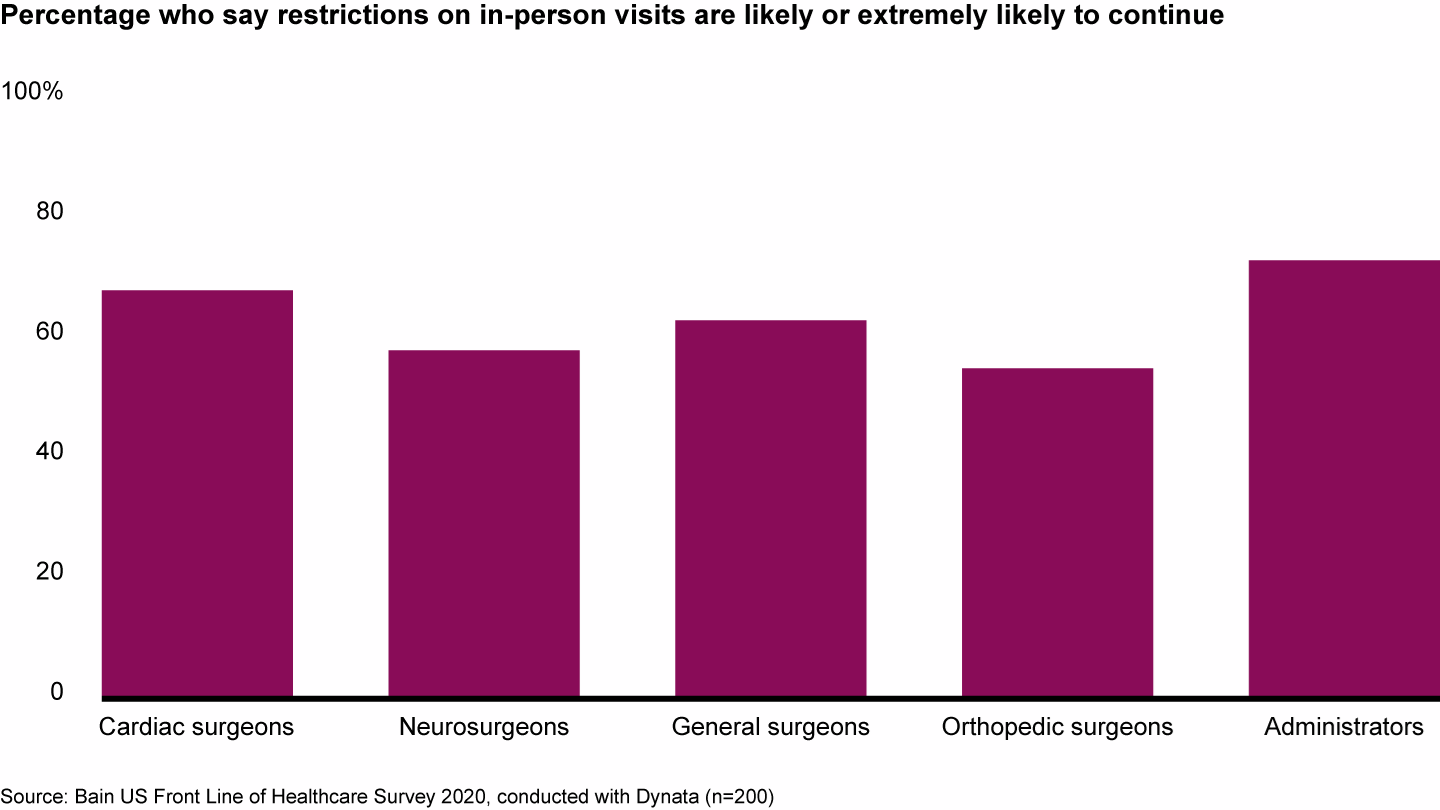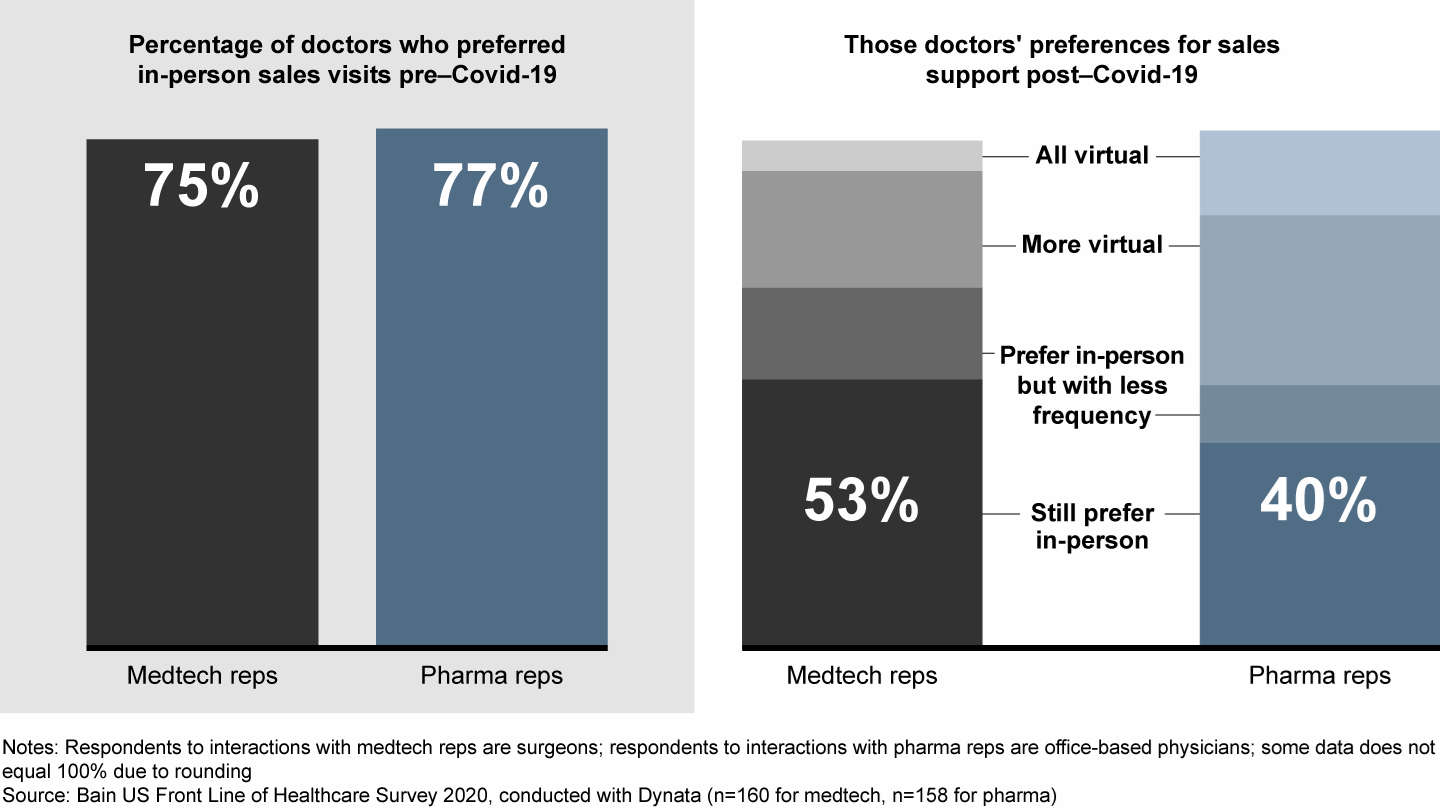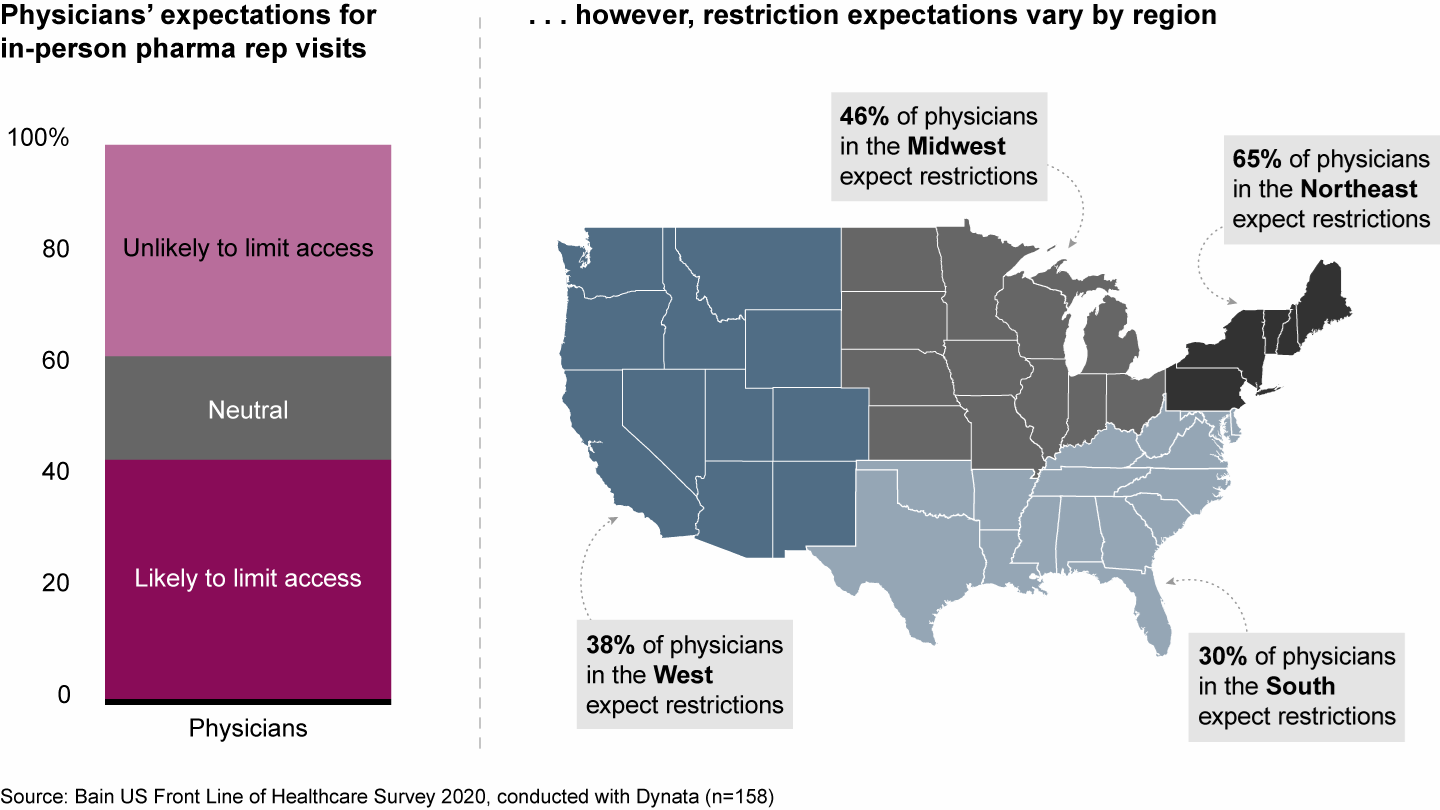Brief

At a Glance
- About 60% of surgeons believe that restrictions on in-person sales representative access are likely to persist even after a Covid-19 vaccine is available.
- Of the 75% of physicians who preferred in-person visits from medtech representatives prior to Covid-19, 47% now prefer virtual exchanges or less-frequent visits.
- Many physicians once skeptical of virtual interactions with sales reps now report these exchanges are high quality.
This article is part of Bain's report US Healthcare Trends 2020: Insights from the Front Line. Explore more insights from the report here.
Covid-19 has changed how medtech and pharma representatives interact with physicians, and the new protocol is likely to endure even after a vaccine or treatment is available.
Surgeons traditionally have recognized the importance of on-site service visits by medtech sales representatives. Prior to Covid-19, 75% of surgeons preferred in-person visits, especially for device servicing and on-call technical support. Orthopedic surgeons in particular value in-person interactions for operating room support and case coverage for implants, saying reps provide valuable training and oversight.
In the aftermath of Covid-19, however, physicians are likely to shift more marketing and training events to virtual settings. These interactions are often critical opportunities to build relationships with surgeons, and digital exchanges will require sales reps to develop new skills. About 60% of surgeons and administrators believe that restrictions on in-person sales rep access are likely to persist even after a Covid-19 vaccine or treatment is available, especially for sales functions like new product introductions and educational trainings (see Figure 1).
About 60% of US surgeons believe that restrictions on in-person medtech sales rep visits are likely to persist after Covid-19


Of the 75% of physicians who preferred in-person visits from medtech representatives prior to Covid-19, 47% now prefer virtual interactions or less-frequent visits (see Figure 2). Data from Bain & Company’s 2020 US Front Line of Healthcare survey shows that general surgeons and neurosurgeons are more likely to prefer to engage with sales reps virtually once a vaccine is available, compared with other surgical specialties such as orthopedic and cardiac.
After Covid-19, the commercial model for pharma and medtech reps will require a mix of in-person visits and virtual support


For the remainder of the pandemic, surgeons who may prefer in-person interactions for product evaluation, training, and tech support and monitoring are likely to restrict on-site access. They also may try to shift relationship building and marketing interactions to a virtual setting. To reach surgeons and hospitals effectively, medtech companies will need a mix of commercial models, as restrictions are likely to vary by specialty, site of care and region. Today, several months into the pandemic, medtech companies still are in the early stages of building these capabilities. Understandably, in the haste to address a dramatically different patient care environment, companies often approach virtual interactions in an ad hoc and reactive manner, as opposed to forward thinking and strategic.
As for pharma sales visits, 43% of physicians report that their employers are likely to limit in-person interactions with reps even after a Covid-19 vaccine or treatment is available (see Figure 3). In the next 6 to 12 months, pharma companies plan to invest in digital channels regionally as needed, responding to local restrictions. Post–Covid-19, some pharma companies and reps may pursue a hybrid sales model similar to medtech’s, but many will seek to return to in-person visits given that strategy’s past success.
Nearly 45% of US physicians believe that restrictions on in-person pharma sales rep visits are likely to continue after Covid-19


Our research also shows that physicians’ views on interactions with pharma sales reps are evolving. Doctors now say they get the most value from transactional exchanges, such as receiving drug samples and coupons. By contrast, in 2017, they most valued receiving educational materials and medical literature, both of which can be done online without compromising the integrity of the interaction.
Nearly 60% of the physicians we surveyed in 2020 who previously preferred in-person interactions now want more virtual dialogues or fewer in-person visits. Although many doctors previously believed that interactions like consultations on new drug samples or trend data could not be moved to a virtual setting without sacrificing the integrity of the interaction, they now acknowledge that many virtual interactions are high quality and convey the same information as in-person meetings.
Digital models have emerged as a safe alternative means of delivering healthcare services during the Covid-19 pandemic—both to patients needing treatment and to physicians seeking pharma and medtech sales services. It is likely that some, but not all, elements of the virtual model will endure. As a result, pharma and medtech companies’ migration to virtual selling will need to evolve over time, with careful consideration of customers’ evolving attitudes toward virtual selling.

About the Research
Data powered by Dynata, a leading global first-party data and insights platform.

Insights from the Front Line
From physician burnout to telehealth, the pandemic has reshaped the healthcare landscape. Bain's series, US Healthcare Trends 2022: Insights from the Front Line, examines how the industry is confronting current challenges, including patient and physician satisfaction, the transition to value-based care, and omnichannel care.